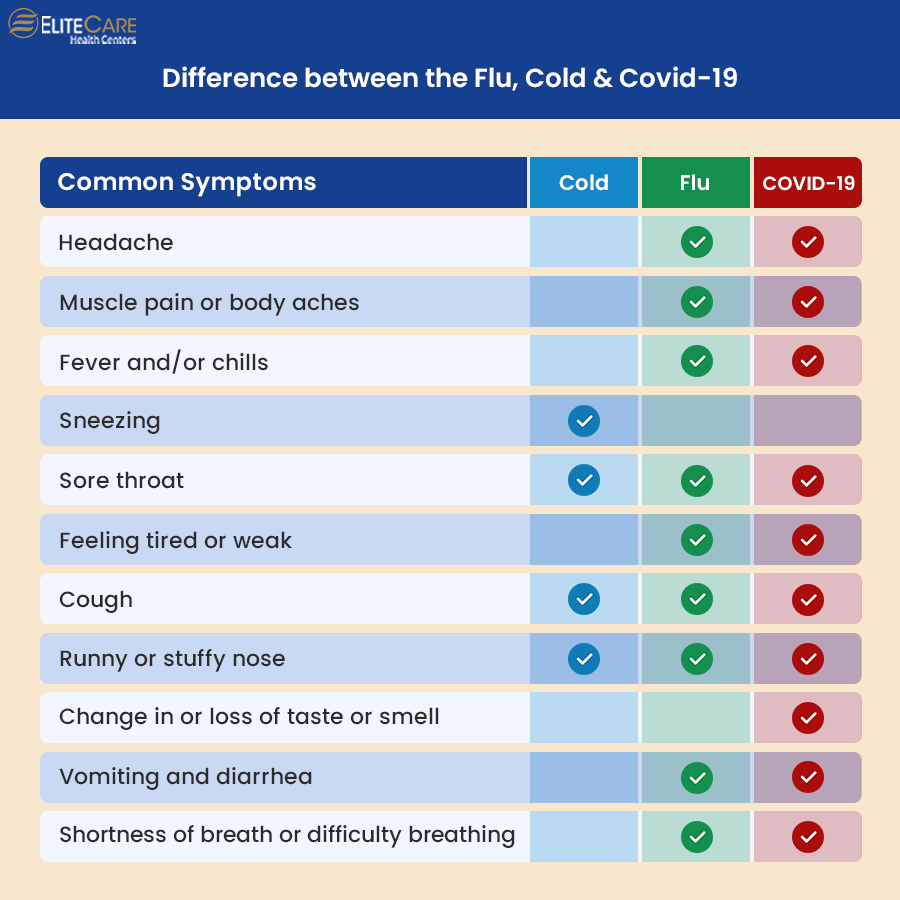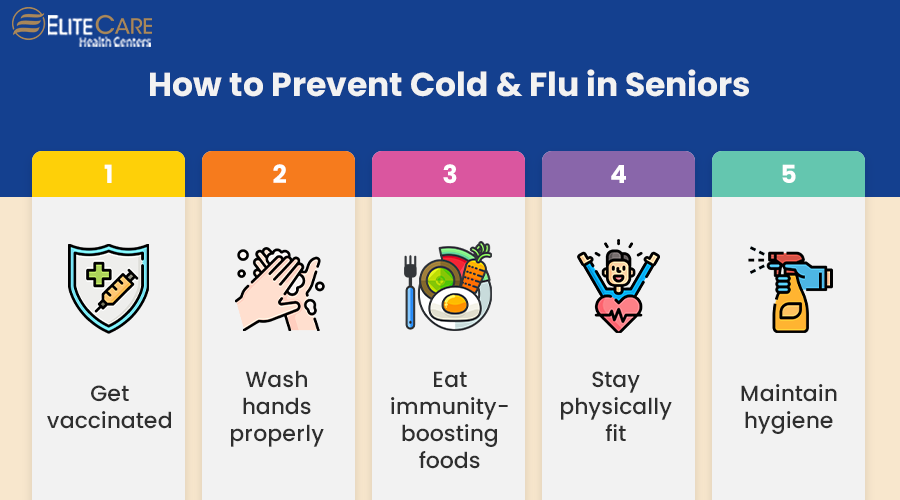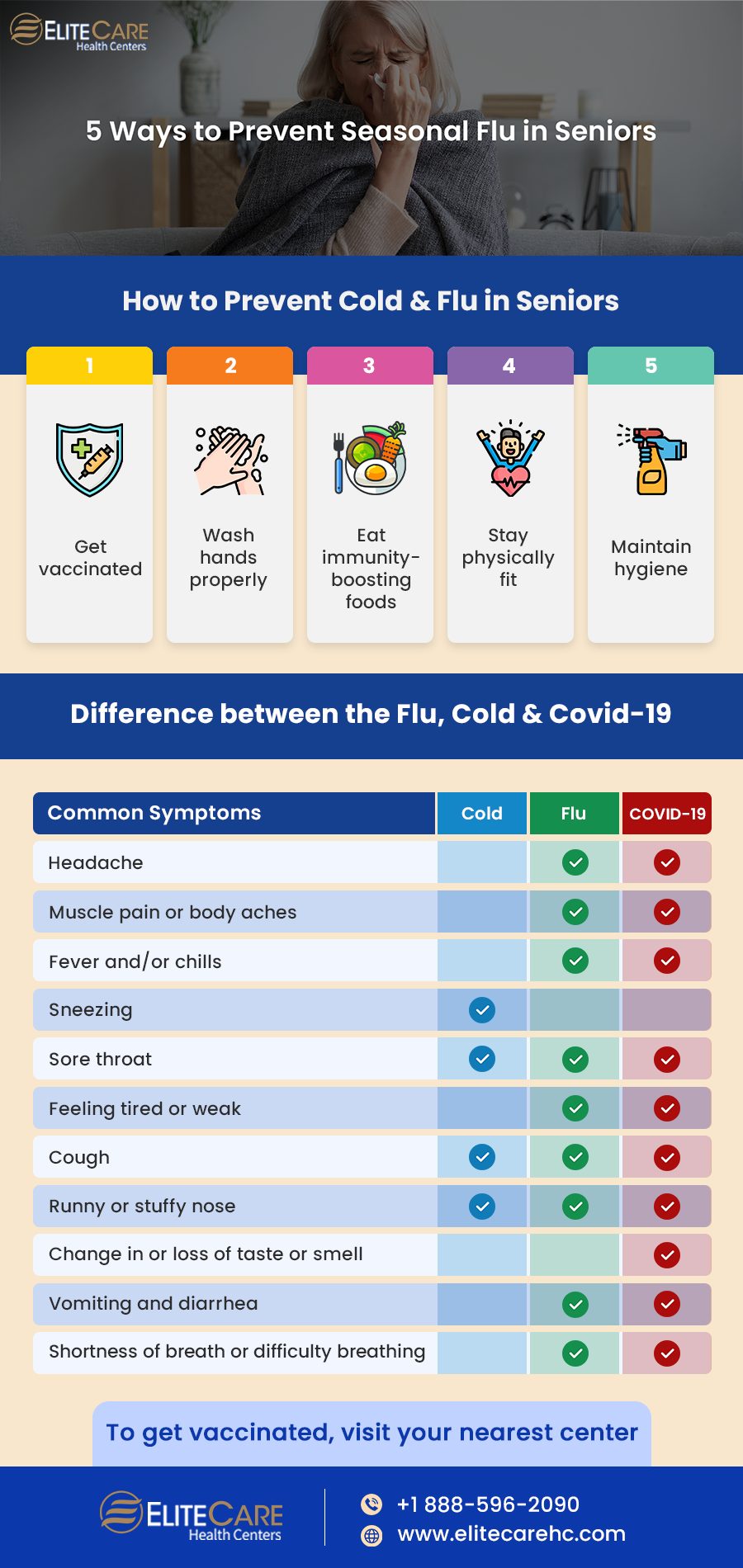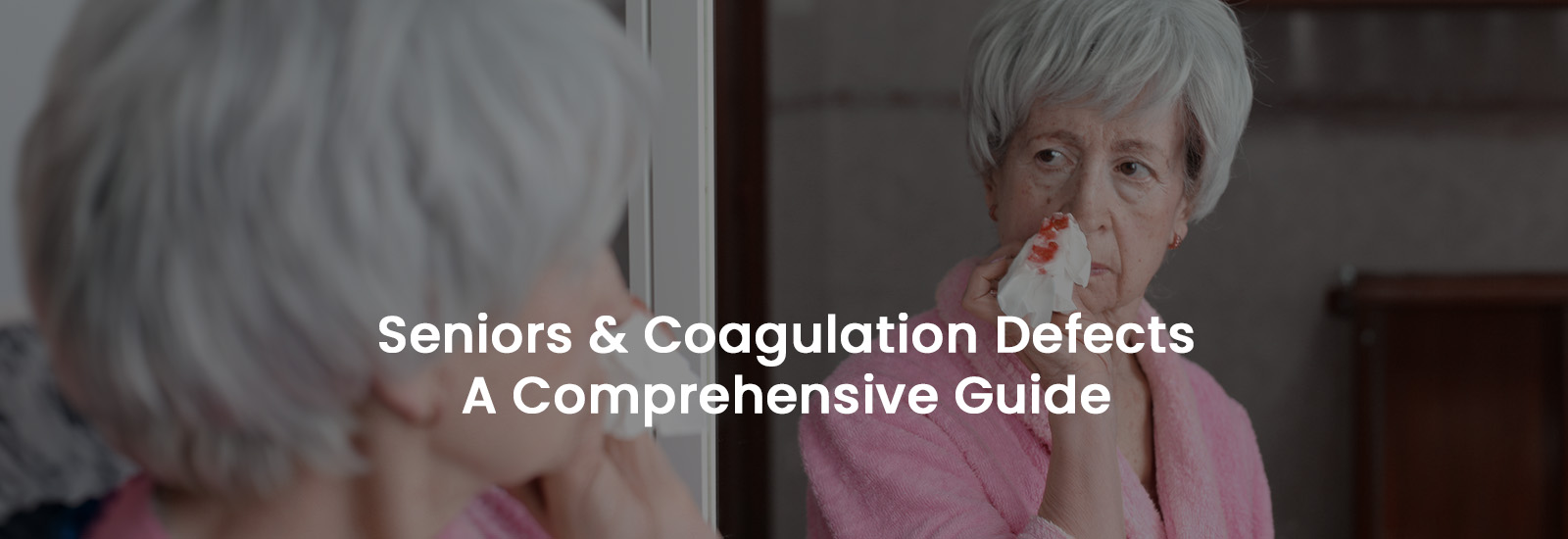
Every year, millions of people suffer from seasonal influenza in the United States, mainly in the fall and winter. Popularly known as the flu, seasonal influenza is a respiratory illness where the nose, throat, and sometimes even the lungs get infected with virus. While the flu is a mild illness for most people, it can create complications, even life-threatening situations for some – including older adults.
Why is Seasonal Flu more Dangerous for Older Adults?
As we age, our immune system becomes less able to fight off infections. For this reason, the flu season can be particularly challenging for seniors. Even a seemingly mild cold can pose a health threat and lead to secondary infections like pneumonia. Besides, the common cold or the flu can aggravate symptoms of existing chronic diseases such as asthma, COPD, emphysema, etc. that seniors often suffer from.
The Difference Between the Flu, Cold, and Covid-19

Although the symptoms of flu, common cold, and covid-19 are similar and hard to distinguish from each other, there are a few facts that help in differentiating amongst them.
- All three of these respiratory illnesses are caused by different viruses and show similar symptoms. Thus, if seniors show any signs, consult a healthcare provider to determine the cause of the illness. Do not opt for self-medication.
- A cold is generally milder than the flu and the recovery period is also shorter. On the other hand, the flu and COVID-19 have similar symptoms, and both have longer recovery times. But in the case of COVID-19, the symptoms are more severe, and the infected person generally experiences a lack of in smell or taste.
- People with the flu can have a fever, chills, dry cough, general pain, headaches, and feel lethargic. Sore throat, sneezing, stuffy nose, or stomach problems are less common with influenza.
Read More: Importance of Healthcare and Wellness
How to Prevent a Cold and Flu in Seniors

To prevent additional health complications, the most effective way to keep the elderly protected during flu season is to follow preventative measures. Here are 5 ways to prevent colds and flu in seniors.
1. Get vaccinated
According to the Centers for Disease Control and Prevention, a standard flu shot reduces the risk of contracting the flu by 40 to 60%. Flu shots save the elderly during flu season in two ways:
- It reduces their risk of getting the flu and even if they get it – its less intense.
- Getting a flu shot means reducing the risk of infecting other people and vice versa.
It is most beneficial to get the flu shot either in October or in November, right before the flu season hits.
Moreover, while getting the flu shot, do not forget to ask about the pneumonia vaccine as well. Older adults tend to suffer from pneumonia once they catch the flu or a cold which can even lead to hospitalization. Consult a doctor who will prescribe pneumonia vaccine.
2. Wash your hands properly
Covid-19 has taught us the importance of hand hygiene and why it is important to use the right technique to clean our hands. By regularly washing and sanitizing hands, seniors can avoid a wide range of cold and flu germs. We often overlook the areas under our fingernails and on the back of our hands that can house bacteria and germs. Hence, wash thoroughly, keeping these proper handwash techniques in mind.
Older adults who often suffer from mobility issues, can find it difficult to get up frequently to wash their hands. In that case, keep a bottle of hand sanitizer near them which can work just as effectively as a handwash.
3. Eat immunity-boosting foods
Adults aged 65 and older get easily infected with the flu virus because of a weakened immune system. One of the effective cold prevention measure is to follow a well-balanced diet rich in immunity-boosting vitamin C, antioxidants, and protein. Add foods such as eggs, broccoli, spinach, citrus fruits like lemon and orange, nuts and seeds, green tea, etc.
Although it is best to get this nutrition through foods, some seniors may have difficulty digesting these foods due to digestive issues. In that case, they can take supplements, but only after consulting with their doctors.
4. Stay physically fit and hydrated
Staying physically active is a very effective way to maintain a healthy immune system. According to researchers, it can cut the risk of colds and the flu by a third. Try aerobic exercises like brisk walking, and swimming, or strength training exercises like wall pushups or weightlifting under expert supervision. Strengthening the immune system will help seniors fight the influenza viruses more effectively.
In addition, adequate hydration is also required to prevent colds and the flu. Drinking plenty of water will help keep the nasal passage moist and trap germs. Besides, drinking adequate water will also help to flush toxins out of the body and maintain overall well-being.
5. Follow healthy habits
A few healthy habits that can protect elderly people from flu viruses are as follows:
- Avoid touching the eyes, nose, and mouth, from where germs can easily enter.
- Keep surfaces that seniors frequently touch – such as doorknobs and sidebars – scrupulously clean
- Avoid large gatherings and stay away from sick people as older adults are more prone to catch colds and the flu easily due to weaker immune systems.
How to Deal with the Flu
What can a caregiver do once a senior family member catches the flu even after following these measures? The caregiver should keep a close eye on the health of infected family members and provide them with support that can reduce the intensity of their symptoms and make them more comfortable.
- First, ensure they are taking as much rest as possible to allow their body to heal. This means abstaining from social outings and activities and getting adequate sleep.
- Give them hot, comfort foods such as chicken soup that will ease inflammation and improve hydration.
- If they are suffering from a sore throat or throat pain, get them to drink tea with honey.
- Use a cool-mist humidifier which can help reduce nasal inflammation.
- Gargling with salt water can help a great deal to loosen mucus and ease throat pain and nasal congestion.
- If they are suffering from a severe cough or chest congestion, apply a vapor rub or help them with steam inhalation.
- Seniors often have trouble sleeping or resting due to nasal and chest congestion. Ask them to keep their heads at a 45-degree angle to prevent mucus from accumulating in their sinus cavities.
- If they smoke, ask them to stop as it can infect the lungs as well as the nasal passages.
Read More: How to Find the Right Primary Care Provider?
Conclusion
Most people, including older adults, recover easily from colds and the flu. But keeping their underlying health issues in mind, it is wise to consult a doctor whenever they develop flu-like symptoms. If they have trouble breathing or they are suffering from chest pain, seek medical attention immediately from a doctor or in an emergency room. Contact your nearest EliteCare Health Centers to get your elderly family member vaccinated at the earliest.






